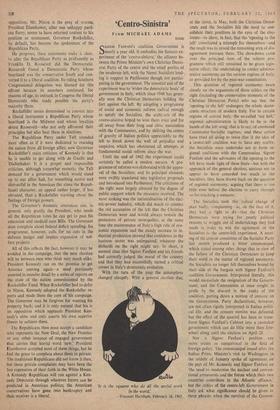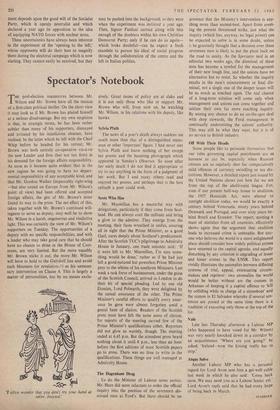Tentro-Sinistra'
From MICHAEL ADAMS
ROME
SIGNOR FANFANI'S coalition Government is narly a year old. It embodies the famous ex- periment of the `centro-sinistra,' the alliance be- tween the Prime Minister's own Christian Demo- crat Party of the centre and the small parties of the moderate left, with the Nenni Socialists lend- ing it support in Parliament though not partici- pating in the government. The essential aim of the experiment was to 'widen the democratic basis' of government in Italy, which since 1948 has gener- ally seen the Christian Democrats holding the fort against the left. By adopting a programme of social and economic reform radical enough to satisfy the Socialists, the archi:ects of the centro-sinistra hoped to woo them once and for all away from their long and close association with the Communists, and by shifting the. centre of gravity of Italian politics appreciably to the left to break down the wall of prejudice and suspicion which has obstructed all attempts at fundamental social reform since the war.
Until the end of 1962 the experiment could certainly be called a modest success. A pro- grammeof reforms was elaborated with the appro- val of the Socialists; and its principal elements were swiftly translated into legislative proposals and introduced into Parliament. The criticisms of the right were largely silenced by the degree of public support which the measures received. The most striking was the nationalisation of the elec- tric-power industry, which did much to counter the old accusation of the left that the Christian Democrats were and would always remain the protectors of private monopolies; at the same time the maintenance of Italy's high rate of eco- nomic expansion and the steady increase in in- dustrial production showed that confidence in the business sector was unimpaired, whatever the diehards on the right might say. In short, it seemed clear that Signor Fanfani and his friends had correctly judged the mood of the country and that they had successfully turned a critical corner in Italy's democratic evolution.
With the turn of the year the atmosphere changed abruptly. With a general election due, 'It is the squares who do all the useful work in the world.'
—Viscount Hailsham, February 16, 1963. at the latest, in May, both the Christian Demo- crats and the Socialists felt the need to con- solidate their positions in the eyes of the elec- torate—to show, in fact, that the 'opening to the left'. constituted a triumph for themselves—and the result was to reveal the remaining area of dis- agreement between them. The showdown came over the principal item of the reform pro- gramme which still remained to be given legis- lative effect; the undertaking to confer adminis- trative autonomy on the various regions of Italy, as provided for by the post-war constitution.
This question of regional autonomy bears closely on the arguments of those critics on the right (including the conservative elements of the Christian Democrat Party) who say that the `opening to the left' endangers the whole demo- cratic structure of modern Italy. For in certain regions of central Italy, the so-called 'red belt,' regional administration is likely to be in the hands of the left wing; that is to say, of combined Communist-Socialist regimes; and these critics have tried all along to insist that if the idea of a centre-left coalition was to have any reality, the Socialists must undertake not to form re- gional coalitions with the Communists. Signor Fanfani and the advocates of the opening to the left have made light of these fears—but with the approach of the general election, anxious not to appear to have conceded too much to the Socialists, they have drawn back on the question of regional autonomy, arguing that there is too little time before the election to carry through so far-reaching a measure.
The Socialists took this radical change of plan badly, complaining—as, on the face of it, they had a right to do—that the Christian Democrats were trying for purely political reasons to wriggle out of undertakings they had made in order to win the agreement of the Socialists to the centre-left experiment. A meet- ing of the central committee of the Socialist Party last month produced a bitter communique, which stated among other things that in view of the failure of the Christian Democrats to keep their word in the matter of regional autonomy, the Socialists no longer felt themselves bound by their side of the bargain with Signor Fanfani's coalition Government. Interpreted literally, this would necessitate the resignation of the Govern- ment, and the Communists at once sought to profit by the discord in the ranks of the coalition, putting down a motion of censure on the Government. Party declarations, however, are not often rigidly interpreted in Italian politi- cal life, and the censure motion was defeated, but the effect of the quarrel has been to trans- form Signor Fanfani's Cabinet into a caretaker government which can do little more than free- wheel along until the election on April 28.
Nor is Signor Fanfani's position any more secure or unequivocal in the field of foreign policy. The communique issued after the Italian Prime Minister's visit to Washington in the middle of January spoke of agreement on the part of Mr. Kennedy and Signor Fanfani on `the need to modernise the nuclear and conven- tional armaments and the forces which their two countries contribute to the Atlantic alliance,' but the critics of the centre-left Government in Italy ask what significance should be given to these phrases when the survival of the Govern- ment depends upon the good will of the Socialist Party, which is openly neutralist and which declared a year ago its opposition to the idea of equipping NATO forces with nuclear arms.
These uncertainties have always been inherent in the experiment of the 'opening to the left,' whose opponents will do their best to magnify them during the electoral campaign which is now starting. They cannot easily be resolved, but they may be pushed into the background, as they were when the experiment was initiated a year ago. Then, Signor Fanfani carried along with him enough of the doubters within his own Christian Democrat Party; only if he can do so again— which looks doubtful—can he expect a fresh mandate to pursue his ideal of social progress through the collaboration of the centre and the left in Italian politics.



































 Previous page
Previous page